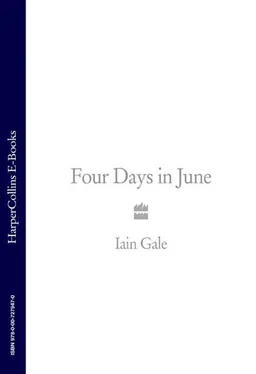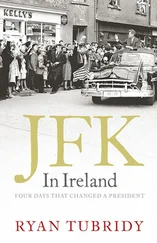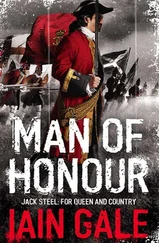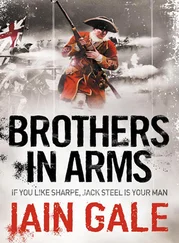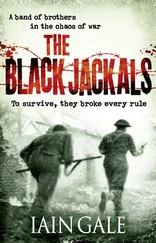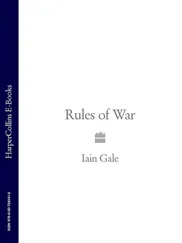The sounds of the camp were suddenly split by distant gunfire. A low rumble. Ziethen listened more closely. Cannon. Six-pounders. Regimental artillery. The guns which in the French army alone accompanied every corps, making it into a self-contained army. That would be Thuin. The French bombardment before the attack. Naturally he would obey Blü cher’s plan to the letter. Would pull his men back here – to Charleroi – a slow retiral to protect the bulk of the Prussian army which would gather at Sombreffe. His outposts at Ham and Thuin would have to be sacrificed to delay the enemy advance. No unit was to support them, no one to go to their aid. They were expendable. Treskow’s cavalry would have to cover them. The Prussians would be overrun. His own old regiment would suffer. But there was no alternative. Ziethen knew that if he fell back too slowly he would be surrounded, too quickly and he would allow a swift French advance to engulf not only him but the entire wing. And then Fleurus would be perfect for a limited defence, perhaps even for Blü cher’s battle. He had reconnoitred it only this past week. Knew the land, the gully, the woods to the rear.
It was of course painfully familiar terrain. The place of another battle. Almost twenty-one years ago to the day, when another French army had broken the 50,000 allied troops of Austria, Britain and Hanover, before taking Brussels. Many soldiers would have taken it as a bad omen. Ziethen touched the black Iron Cross which hung at his neck. Had he been a superstitious man, which thank God he was not, he would have regarded it as a talisman. Which, of course, he did not. Still, he touched it, felt its reassuring coldness. Remembered what it stood for. The blood. The screams of the wounded. The dying. The noise. The smoke. It was as clear in his mind as if it had been yesterday. Haynau. Two years ago. The great plain of Leipzig. He had been awarded the Iron Cross – 1st Class. Gneisenau, naturally, had been made a count. But now was not a time to open old sores. Now was a time to act. A time to fight. A time to hate.
TWO
Brussels, 5.00 p.m. De Lancey
She was exquisitely beautiful. A somewhat girlish face, full-lipped and with huge saucer eyes, and serene beyond her years. There had been other women, of course. Such women as Spain could boast. But Magdalene – Magdalene was everything that he wanted, all these long years.
She was a Scot. Her father, Sir James Hall, farmed at Dunglass, near Berwick, on the coast. Nine thousand acres with at its heart Sir James’s great new house in the eccentrically fashionable Gothic taste. It had first struck De Lancey as being more oppressively gloomy than one of Mrs Radcliffe’s novels. But if Magdalene loved it, then so must he.
It had not been at Dunglass that they had met, but in Edinburgh. At a winter ball, on a chill December evening, in the city’s Assembly Rooms. There, beneath the light of 500 candles, spinning across the floor through the cream of Edinburgh’s society, he had seen her. A face so new, yet so familiar. The shock. Had caught it reflected in her own eyes. Had stopped. Had apologized to his angry partner. Had carried on the dance – clumsy, unthinking. Thunderstruck. Like a blow on the back, a fall in the hunt.
They had talked. And danced, he seemed to remember. And, after the dance, De Lancey had walked through the dark, pre-dawn streets, back up the hill to the Castle, his head filled with visions of Magdalene.
A month after they had met he had received his knighthood. Invited to Dunglass by way of celebration, he had walked with her into the gardens. That little Eden. And it had been there, in that earthly paradise, beneath the oak tree under which her mother had loved to sit during those years while Sir James had been abroad, that he had proposed to Magdalene. And she had accepted.
‘We will always be together, William.’
‘More than that, my darling. I shall never leave you. Never.’
The wedding had been a small affair. A bright, crisp Scottish April morning, only two months ago now. Their church, the tiny kirk of Greyfriars in the heart of old Edinburgh, had been bedecked with branches of blossom and sheaves of daffodils. And, although its architecture was less ornate than he might have liked, the preacher, a Mr Inglis, a regular firebrand, had married them with the utmost eloquence. It was, he felt, true to the spirit of the age. A marriage of intellect and beauty. He recalled her sisters – their pretty, sprigged muslin gowns, their giggling at the advances of his brother officers.
Afterwards they had travelled to Dunglass, as husband and wife. And then ten days of perfect bliss. How he loved her. And in the gardens again, where the spring was everywhere, she had turned to him, her beautiful eyes filled with the need for assurance.
‘We shall never be apart.’ Almost a question now.
‘Never. My dear, darling Magdalene. I shall never leave you.’
Their time had been brief, though, and continually subject to interruption by one of her family. He had not minded, such was his happiness. And her father had opened his mind to so many new things.
Sir James had introduced him to an entirely different way of looking at the world. Had taken him to the cliffs on which Dunglass stood, towering above the waves. Had shown him the rocks. Had told him their secrets. Of the formation of the earth. Of sandstone and schistus. Of the immeasurable force which had torn asunder the then so solid fabric of the globe. And there, in that instant, high above the waves, he had felt himself transported back to a time when the rocks on which he stood were yet at the bottom of the sea. A topsy-turvy time before time. Before revolution and war had blighted the perfection of the earth. His mind had seemed to grow giddy, looking so far down the cliff – so far back into the very abyss of time. He had felt himself on the brink of some great realization. And then Sir James was talking to him. ‘It is, as Hutton says, that we can find no vestige of a beginning to the world –no prospect of an end.’ No end. World without end. He had felt suddenly light-headed. Had seen how his own reason was taking him further into something perhaps than his imagination might care to follow. Had felt an intimation of something like … eternity.
Before he lost himself entirely in that vortex, Magdalene was there. Come, she said, to ‘rescue’ him from her father. And later, when he had told her of his fascination with what Sir James had said, she had taken him to show him the ‘museum of stones’ – stones which she herself had gathered on the nearby beach below the cliff. And then they had climbed down and she had kissed him on that narrow strip of pebbles – there below the cliff. Had made him close his eyes as she stooped to pick something up and then pressed into his hand one particular stone. Quite small, pale golden-yellow, marbled white. Then she had whispered into his ear, her voice barely audible – soft, against the rolling of the waves.
‘Forever.’
He felt the stone again now, its cool roundness, tucked away as it always was, in the pocket of his waistcoat. Ran it between his finger and thumb. Stones. Stones of an incredible age. Stones that seemed to echo the sense of permanence of his new family. Stone on stone, through the generations, he thought. The Halls had their own vault, made from local sandstone, in the parish church – their church. Stones which somehow echoed his own need for a sense of permanence. His need for Magdalene. Like the stones, she was immovable. Utterly dependable in a world in which too often he had seen friendships vanish into atoms before him in the flash and thunder of gunfire. Magdalene, like the stones, was eternity.
And so it was that, together, as husband and wife, they had travelled to London. Wellington had asked for De Lancey particularly as his Quartermaster General – de facto Chief of Staff. It was not quite the post that he had wanted – a colonel on the Staff. But it was an honour, and he was happy to go. To be in at this final reckoning with Boney. And though it was only an acting post while they waited the arrival of Sir George Murray from military operations in Canada, here at last seemed to be the path to promotion for which he had looked so long.
Читать дальше
